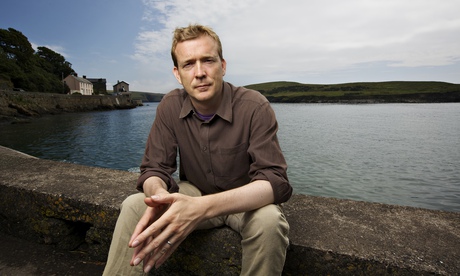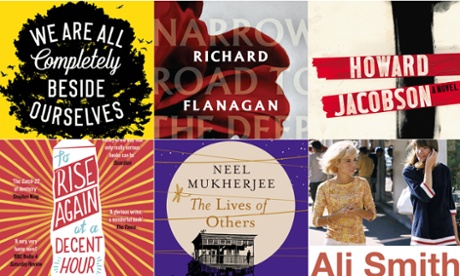Some seasonal traditions are unassailable. As surely as April breeds lilacs out of the dead land, early September breeds new books by famous writers out of the front tables at Waterstone's.
This year sees a particularly heavy crop even by the season's usual standards. New novels are on the way from Haruki Murakami, David Mitchell, Sarah Waters, Martin Amis, Howard Jacobson, Rachel Cusk, Ian McEwan, Will Self and Ali Smith.
And the competition for attention is correspondingly frantic. Each year brings heavier embargoes, tighter exclusive tie-ups with media outlets, and the traditional scruffy launch party with warm white wine and trail of bookshop readings is now as often as not replaced by exclusive one-off author events with price tags heading north of £30.
The timing isn't arbitrary. As well as the end of the holiday season and the wind-up to Christmas, the announcement of the Man Booker shortlist comes on 9 September. The prize is still a force in the publishing ecosystem, so the sweetspot for publishing a potential shortlistee is the first week of September.
"There is a tradition that people of a certain generation deliver in order to be published in the autumn," says Dan Franklin of Jonathan Cape, who has Amis, McEwan and Jacobson on his books. "It's been like that for as long as I've been doing this."
He describes the early September fiction squeeze, however, as "a problem": "If you have Jacobson, Amis and McEwan you would not publish them all within a couple of weeks of each other by choice if it were not for the Booker". He points out that this year the squeeze has got worse. Almost half the books on the longlist were not due to be published until the end of September, and have now had to have their publication dates brought forward.
That's a hint as to how much this year's longlist has confounded expectations. Three who have not been "snubbed" (as it's invariably reported) are Smith, Mitchell and previous winner Jacobson. (Another big-name longlistee, David Nicholls, has his new novel Us published at the end of the month – the pre-planned publicity campaign was just too big to bring forward.)
All three of those books, interestingly, seem to have a slight aspect of speculative fiction to them, an umbrella term for fantastical fiction genres. Ever since Hotel World, Smith has written with surreal and genre-teasing freedom, and How To Be Both – a double-narrative moving between the 1460s and the 1960s – promises to be no different.
Mitchell's The Bone Clocks adds another part to the great interlinked tapestry of his fictional worlds, with their recurring characters and echoing timelines. This one ranges from 1984 to the near(ish) future, as it follows the life of Holly Sykes from adolescence to senescence. One early reader wondered: "How to describe a book that features a band of Atemporals pitted against a band of sinister, soul-devouring Anchorites, who stage an epic battle in a shrine in the Swiss Alps?"
Jacobson isn't usually known for fantastical fiction so J, set in a future where nobody is allowed to talk about the past, is a very intriguing prospect. It's a love story played out in a brutal world shadowed by a past event known only as "What Happened, If It Happened".
The latest from Murakami, Colorless Tsukuru Tazaki and His Years of Pilgrimage, will also be huge. A few authors sell in the hundreds of thousands; Murakami sells in the millions. Murakami's winning gamesomeness is on show again in this story of a lonely boy whose four colour-coded childhood friends (their names in Japanese mean "red pine", "blue sea", "white root" and "black field") abruptly rejected him. Will he find comfort in Farrow and Ball and chum up with "mole's breath" or "cornforth white" instead?
With The Children Act, Ian McEwan's fiction returns to the present-day setting and issues-led mode last seen a decade ago in Saturday. It deals with a high court judge in the family division whose three-decade-long marriage is in crisis. Her complicated feelings about that, and her own childlessness, are stirred when she is asked to decide on the case of a 17-year-old Jehovah's Witness who refuses life-saving medical treatment.
The same urgent contemporaneity – albeit treated from the bar rather than the bench – will be in evidence in Roddy Doyle's Two More Pints. While McEwan's characters worry about Syria and the Leveson inquiry, the protagonists of Doyle's sequel to last year's Two Pints address the horsemeat scandal, topless photos of the Duchess of Cambridge and Jimmy Savile.
The new Martin Amis is anticipated as hotly as ever. The Zone of Interest marks Amis returning to Auschwitz as a subject for the first time since 1991's Time's Arrow. Amis has spoken of an approach to the subject as "central to our self-understanding".
Another veteran time-traveller is Sarah Waters, first acclaimed as a novelist of the Victorian underworld – a sort of Wilkie Collins with dashing lesbians – before writing two novels set in the 1940s. The Paying Guests sees her Tardis land in 1922. "A love story that is also a crime story", the novel germinates with a widow and her grown-up daughter taking a young couple in as lodgers in their Camberwell house.
Will Self's last book, Umbrella, saw 400-odd pages of mind-mangling, century-spanning old-school modernism shortlisted for the Man Booker prize. Nobody then knew – indeed, Self himself didn't know until he'd all but finished writing it – that it would turn out to be the first part of a trilogy. In Shark, Self's eccentric psychiatrist Zack Busner returns. Trigger warnings: contains LSD, widespread psychosis, the bombing of Hiroshima, and a revelatory screening of Stephen Spielberg's Jaws.
Storytelling is a preoccupation in Rachel Cusk's new novel, Outline. Cusk is now perhaps most famous as a memoirist – her account of divorce, Aftermath, was a big deal in 2012. Here she writes about a female author teaching a writing course in Crete. And, a little further off – bumped into next year's Booker catchment – are new novels by Marilynne Robinson and Colm Toibin.
Amid all these tall poppies, there's a climber new to botany in the form of the BBC's Andrew Marr. His first novel, Head of State, is being trailed as a political thriller "making full use of his unrivalled inside knowledge": "While the United Kingdom approaches a crucial and delicately-balanced referendum on Europe, a group of ruthlessly determined individuals will stop at nothing – including murder – to prevent the truth from getting out."
High-profile publications don't always mean sales. And as far as sales prospects go Dan Frankin is, well, not gloomy but cautious: "We don't know how these big books will go."
Jonathan Main of the independent bookshop Bookseller Crow in South London says: "Out of those I'd have thought we're going to do easily the best with Murakami. The Mitchell we'll do well with, Sarah Waters and Ali Smith we'll do well with. Amis and McEwan … It'll greatly depend what the Amis is like: he has a fanbase no matter what. McEwan's reliable. Unless he's written a book as good as Atonement we'd expect to see what we usually sell. Jacobson doesn't exactly pull up trees with his sales.
"The interesting part of running a shop like this is the layer beneath those books, really. We did an event for Jessie Burton's The Miniaturist about a month ago, and that's grown into a huge book. And Matt Haig's book The Humans was easily one of our bestselling books for last year. We sold far more of that than we'd expect to sell any of these."











